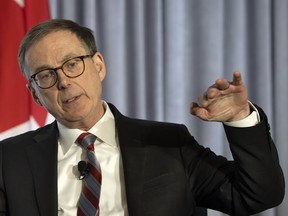Usual ‘forward-looking’ approach too difficult amid uncertainty

Article content
Canada’s trade war with the United States has forced policymakers to be “less forward-looking” than normal, according to Bank of Canada governor Tiff Macklem, who acknowledged trade uncertainty will impact how the central bank takes monetary policy decisions.
Article content
Article content
“If we were to guess where the economy is heading and make policy to optimize that outcome, we’d risk getting it wrong,” said Macklem, during a speech in front of Calgary Economic Development on Thursday. “So we need to set policy that minimizes risk. That means being less forward-looking than normal until the situation is clearer.”
Advertisement 2
Article content
Normally, the central bank makes monetary policy decisions based on where the economy is forecasted to be situated in the future. However, Macklem said this can no longer be the case given the constant uncertainty playing out in a real-time with our largest trading partner.
“And it may mean acting quickly when things crystalize,” he said. “We need to be flexible and adaptable.”
During his remarks, Macklem said the uncertainty is already causing damage on both sides of the border, as U.S. and Canadian consumer confidence has fallen and U.S. stock market indices have declined from recent peaks.
The central bank will remain focused on the pass-through costs of broad tariffs, with Macklem presenting three scenarios on Thursday where the pass-through to inflation is assumed to happen over one year, two years and three years. In the one-year scenario, year-over-year inflation peaks at 2.27 percentage points higher than under normal circumstances in the first quarter of 2026.
Macklem also highlighted the sectors and industries that are most at risk by U.S. tariffs. In the long-term, a 10 per cent tariff on Canadian energy would lead to reduced profitability for Canadian energy producers, which in turn would lead to a drop in investment and potentially employment.
Advertisement 3
Article content
Macklem said the energy industry is used to boom-and-bust cycles, but added “a threat to the Canada-U.S. energy relationship is not something we’ve ever had to contemplate.”
Farmers will also be affected on both sides of the border, with uncertainty around whether tariff exemptions for fertilizers will hold, and the recent announcement by China that it will impose a 100 per cent tariff on Canadian canola.
“It’s a very difficult situation so close to planting season and adds to the uncertainty Canadian farmers are already facing,” said Macklem.
Steel and aluminum tariffs also remain in place, which Macklem said will pose particular disruptions to Quebec and Ontario.
Recommended from Editorial
The Bank of Canada cut its policy rate for the seventh time last week, bringing the overnight rate down to 2.75 per cent. Macklem cited trade uncertainty with the U.S. as a reason for the decision. Despite the Canadian economy ending on good note to end 2024, this new trade crisis has put it at risk, with the central bank previously estimating a three per-cent loss to Canadian GDP over the next two years.
“The Canadian economy managed a soft landing,” said Macklem. “Unfortunately, we’re not going to stay on the tarmac for long.”
Article content


